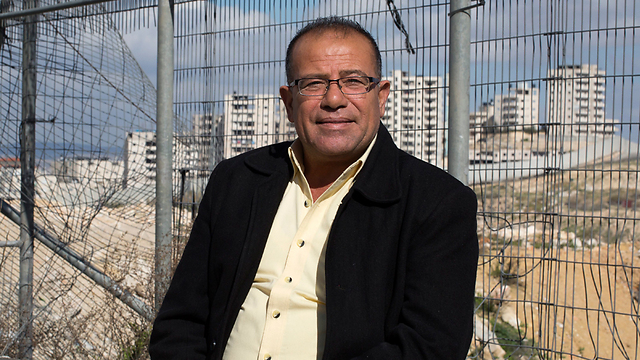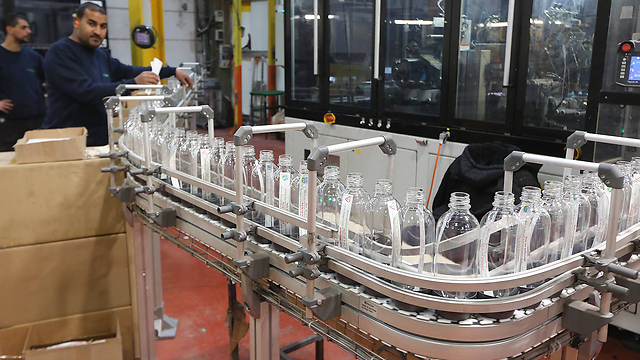Bassam Eid, a human rights activist, says boycotts sonly ends up harming the Palestinians, and says Israelis should demand PM for solution to Israeli-Palestinian conflict: ‘If the Israelis don’t fight the occupation themselves, we will never be able to fight it’.
During a lecture tour of South Africa some three months ago, Bassam Eid, a Palestinian resident of East Jerusalem and human rights activist, voiced harsh criticism of the BDS movement – and this in a country where the boycott campaign has particularly strong public support. “The leaders of the movement were stunned to hear a Palestinian who says that Israel is not an apartheid state,” Eid says in an interview with Ynet’s sister publication, Yedioth Ahronoth.
Eid’s comments, which sparked widespread coverage in the local media, forced the Palestinian diplomatic mission in Pretoria to release a statement noting that Eid does not represent the Palestinians and that the Palestinian ambassador recognizes the importance of the BDS movement.
You’re a strange bird, aren’t you?
“True,” Eid says with a smile. “I’m a very strange bird. But it’s the truth. Every word I say is based on facts.”

Bassam Eid (Photo: Amit Shabi)
Born in the Jewish Quarter of Jerusalem’s Old City in 1958, Eid grew up in the Shuafat refugee camp in northeast Jerusalem and moved some 15 years ago to Beit Hanina in East Jerusalem.
In the late 1980s, he teamed up with the group of people who founded B’Tselem and worked for the organization for seven years. Thereafter, he set up a new human rights organization, the Palestinian Human Rights Monitoring Group.
Unlike B’Tselem, Eid’s organization focused only on human rights violations perpetrated by the Palestinian Authority in the West Bank and the Hamas regime in the Gaza Strip.
“There are many human rights organizations in Israel, whereas there are and were hardly any organizations in the Palestinian Authority that monitored its actions in this regard,” Eid says.
The beginning looked promising. Eid’s organization received significant funding from European states and managed to employ researchers who operated in the West Bank and Gaza Strip. Five years ago, however, things changed, and the funding from Europe came to an end.
“I think it happened because European policy in recent years has been to come down hard on Israel and not the Palestinian Authority,” Eid says. “They view Israel as the main obstacle to the peace process and want to support the PA. One of the ways to show this support is to stop funding organizations that are critical of the PA.”
Unable to survive without the funding, Eid’s organization was shut down. Ever since, he’s been traveling the world, lecturing and giving interviews, criticizing the PA, and, more recently, trying to explain to the world that the activities of the BDS movement are only undermining the dream of a Palestinian state.
Isn’t it more natural for a Palestinian to support such actions?
“I’m opposed to the boycott because it only ends up harming the Palestinians themselves. Take, for example, the SodaStream plant in Mishor Adumim that is now moving some of its operations to Be’er Sheva. I’ve met with Palestinians who worked at the factory and were fired because of the move. They told me they were earning an average of NIS 5,000 a month there, and that today they are being offered salaries of just NIS 1,400 in the PA.
“People there are deep in debt because they have taken on long-term commitments based on the understanding that their work at the plant would continue; but reality has slapped them in the face because of the pressure created by BDS movement. Today, they are running between the courts and the bailiff offices and is anyone taking any notice of them? Do you think the boycott movement cares about them at all?”

The SodaStream factory in Mishor Adumim where many Palestinians worked until the company decided to move (Photo: Gil Yohanan) (photo credit:IDC)
Proponents of the boycott movement believe that economic pressure will force Israel to reach a peace settlement with the Palestinians and withdraw from the West Bank.
“I don’t agree with that argument. Over the coming period, Israel is going to invest all its efforts in combatting the boycott, thus the option of peace negotiations won’t be on the agenda at all. The proponents of the boycott, backed by the European states, have opened another front in the conflict, instead of investing all their efforts in the most important thing – negotiations.”
But there were no negotiations over the past year.
“True, but opening a new front in the form of a boycott will only delay the opening of talks by another two or three years. They’re claiming after all that there is apartheid in Israel, and therefore what worked in South Africa can work here too; but Israel is not an apartheid state.”
Tainted with anti-Semitism
Many believe that the BDS movement is tainted with anti-Semitism, and Eid has no doubts in this regard. “There are many anti-Semitic elements that have hopped onto the BDS bandwagon,” he says. “I wonder why those same people remain silent when Palestinians are slaughtered in the Yarmouk refugee camp in Syria. Of that I say: No Jews – no news. This is also the reason why the thing that bothers me the most is the fact that there are Jews among the BDS movement leadership.”
Eid doesn’t think the BDS movement has the ability to create a domino effect that would lead to intense international pressure on Israel. “Look how many apologies and clarifications have been published since Orange CEO Stephane Richard spoke out against Israel,” he says. “You have to understand – the balance of power between the BDS movement and Israel is the exact same as the balance of power between Hamas and Israel. Hamas will never defeat Israel in any war, and the same goes for the BDS movement. The Israeli public gives it a lot more credit and power than it actually deserves.”
Eid notes, however, that nothing lasts forever. “The world remains relatively quiet when it comes to (human rights) violations perpetrated in the West Bank by Israel as a democratic state,” he says. “This is convenient for the Israeli government, but the international pressure will come eventually. Nevertheless, I expect this pressure to come in the form of carrots, not sticks – for the world to make it clear to Israel what it will gain from ending the occupation rather than adopt boycotts that will only distance the dream of a Palestinian state.”
So what do you see as the right solution?
“If the Israelis don’t fight the occupation themselves, we will never be able to fight it. Instead of calls for a boycott, I’d like to see a million Jews standing outside the Prime Minister’s Office in Jerusalem and demanding a solution that will put an end to the Israeli-Palestinian conflict; but I know, too, that Netanyahu is a stubborn man and it won’t be easy.”
Do you think the Palestinian leadership sees you as a traitor?
“Maybe they think I’m a traitor or a collaborator or a CIA agent. I don’t care. I know what pains the Palestinian man in the street and what really concerns him – and that’s his economic security and not boycotts. Palestinian leaders like Jibril Rajoub are trying to use the boycott weapon to climb the political ladder. I go to Nablus, Bethlehem and Ramallah and know that many Palestinians agree with me.”o
As a Palestinian, what is your message to the BDS movement?
“I want to tell them that we have had our fill of wars here; and as long as the Palestinian people aren’t boycotting Israel, they don’t need to do so for us.”
Do you have criticism for Israel too?
“The Israeli public is a little dazed. It doesn’t know who is leading it and where he is leading it to. The main problem is the occupation, and the Israelis have yet to internalize the fact that the occupation comes with a very high price, which the Israelis themselves will pay.”
As reported by Ynetnews
